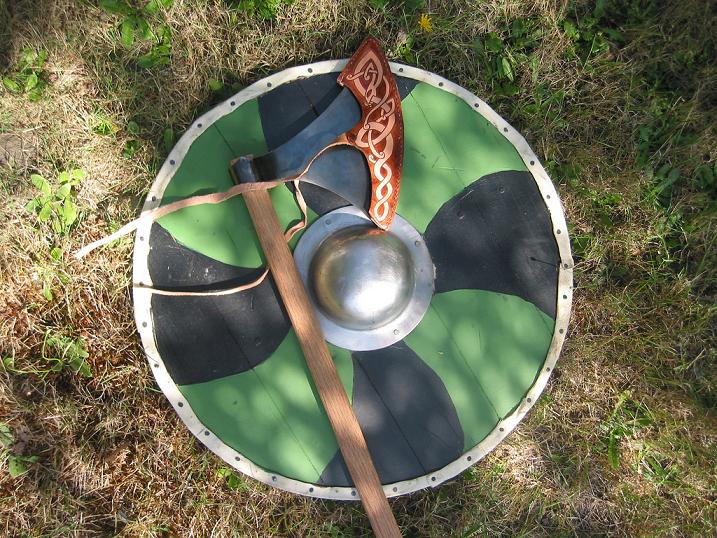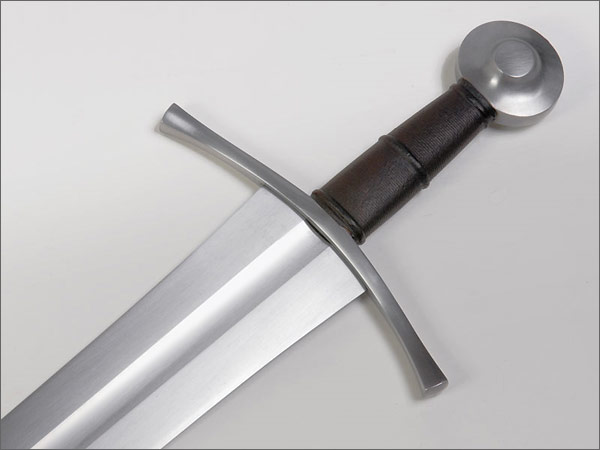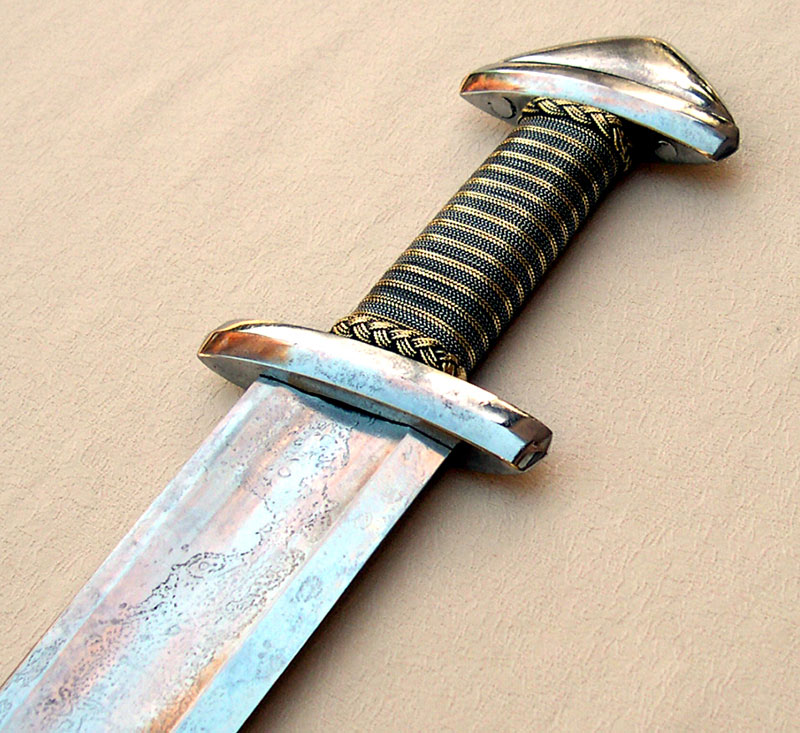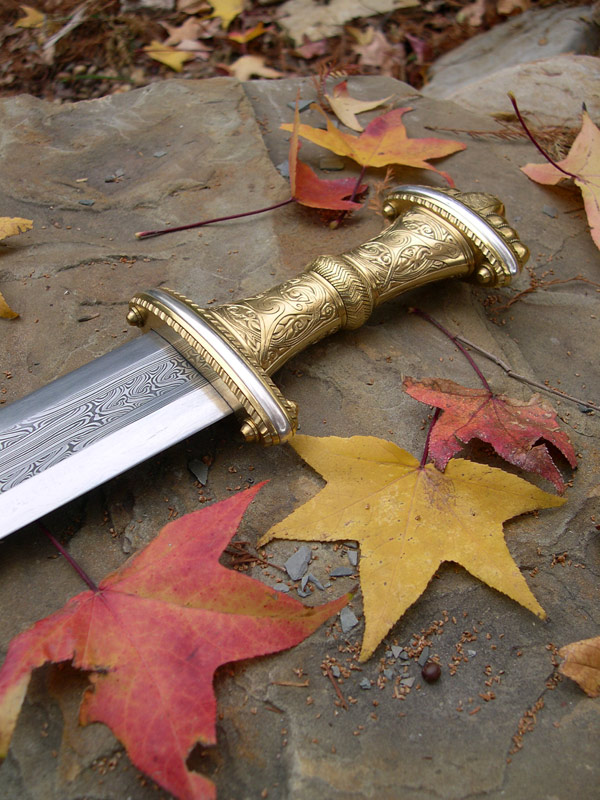People often complain about bad weather ruining their pictures. I've seen it mentioned several times in recent posts and more often throughout the years. I've taken hundreds of pics for this site and almost every one of them indoors in my basement. Three 500-watt halogen lights bounce off my white celing, diffusing nicely. Set the white balance right on the camera and try to meter properly (I'm not always great at the last one) and use a decent camera (mine is a few years old and was only a $300 camera when new).
The old wisdom in sword photography was that outdoors was best. It never worked for me--Ohio weather is too unpredictable. I take my shots indoors now, where weather and time of day have no bearing.
I'm pretty sure Nathan shoots most of his pics indoors, and I know his photo equipment is much better than mine. :) That (and his artistic talent) are why his shots are better than mine...
Have people had good experiences shooting outdoors? I found it to be more hassle than it's worth.
Yeah, I've never posted a photo of a sword that was taken outside.
Chad,
I took some pictures of my danish axe outside because I don't have a lot of floorspace in my house, and it didn't occur to me that I have a halogen floodlight sitting in my garage until I read your post :lol: .
This one came out pretty well on a sunny day, beneath a tree. I like the effect, but it's not great from a documentation standpoint. I had a lot of problems getting the right amount of light because sunlight is bright but glaring. Some angles caused washout and glare, and others too much shadow. I'd bet that some cloudcover is ideal.
 Attachment: 120.31 KB
Attachment: 120.31 KB

I took some pictures of my danish axe outside because I don't have a lot of floorspace in my house, and it didn't occur to me that I have a halogen floodlight sitting in my garage until I read your post :lol: .
This one came out pretty well on a sunny day, beneath a tree. I like the effect, but it's not great from a documentation standpoint. I had a lot of problems getting the right amount of light because sunlight is bright but glaring. Some angles caused washout and glare, and others too much shadow. I'd bet that some cloudcover is ideal.

| Nathan Robinson wrote: |
| Yeah, I've never posted a photo of a sword that was taken outside. |
That's what I thought, but I hate making absolute statements, especially on other people's behalf.
| Gavin Kisebach wrote: |
| Chad,
I took some pictures of my danish axe outside because I don't have a lot of floorspace in my house, and it didn't occur to me that I have a halogen floodlight sitting in my garage until I read your post :lol: . This one came out pretty well on a sunny day, beneath a tree. I like the effect, but it's not great from a documentation standpoint. I had a lot of problems getting the right amount of light because sunlight is bright but glaring. Some angles caused washout and glare, and others too much shadow. I'd bet that some cloudcover is ideal. |
Cloud cover or an angle of the sun that isn't directly on the blade is what people always talk about for outdoor sword photography. Too many variables for me. :)
I use two halogen floor lamps that point straight up (the kind you can't buy any more because some doofus stuck it to close to a curtain and caught the fabric on fire or something) and 1 halogen work light, on a music stand, angled up as well.
I use a rectangular sheet of vinyl for background. My futon, from which I take many shots, is on one long edge of the vinyl. The work light is opposite it. The floors lamp are on either side, halfway along the vinyl's short edges.
Outside shots, like Gavin's above, are great when you want to do "environmental" photos that show the sword staged with something in the environment. The problem with this sort of thing is one is at the mercy of the conditions. Timing is everything.
With something like what Chad and the crew at myArmoury.com have to do -- take photos of swords for reviews and other things that are intended to be consistent and whatnot -- one really needs the ability to control the environment, in particular, the lighting.
In Chad's case, his answer to this problem was to purchase a reusable background material (white vinyl, I believe) and a lighting solution that he use to create a controllable and consistent effect. In his case, as he mentioned, he chose shop/work lights (like these lights) This allows him to take photos at any time and still be able to create a consistent look, both in terms of lighting and in terms of staging, each and every time.
Environmental photos are more interesting with more "personality", but this can also bone done in the "studio" as well with some careful staging. Either way, each type of photography has its value.
With something like what Chad and the crew at myArmoury.com have to do -- take photos of swords for reviews and other things that are intended to be consistent and whatnot -- one really needs the ability to control the environment, in particular, the lighting.
In Chad's case, his answer to this problem was to purchase a reusable background material (white vinyl, I believe) and a lighting solution that he use to create a controllable and consistent effect. In his case, as he mentioned, he chose shop/work lights (like these lights) This allows him to take photos at any time and still be able to create a consistent look, both in terms of lighting and in terms of staging, each and every time.
Environmental photos are more interesting with more "personality", but this can also bone done in the "studio" as well with some careful staging. Either way, each type of photography has its value.
I found that good natural light is better for showing details/true colors. Additionally, any type of flash washes things out and you have to Photochop it to make it look right...
| JE Sarge wrote: |
| I found that good natural light is better for showing details/true colors. Additionally, any type of flash washes things out and you have to Photochop it to make it look right... |
Yeah, the flash is about the worst thing you can use. I find 1500 watts of light and some camera settings Nathan helped me with eliminate the need for the flash altogether for the kind of stuff I shoot.
I think a lot of good detail is possible with indoor photography. Here's an example that shows a lot of detail:
[ Linked Image ]
I've found true colors are best achieved when your white balance setting is right and your metering is as good as you can make it, regardless of light source.
But I know mileage varies as does equipment and experience. I don't consider myself a good photographer at all. I can put out a decent sword pic with Nathan's help, but I'm no Ansel Adams. I'm kind of a one trick (or a half trick) pony. :)
| JE Sarge wrote: |
| I found that good natural light is better for showing details/true colors. Additionally, any type of flash washes things out and you have to Photochop it to make it look right... |
Only with bad lighting or improper exposure.
Flash photography is not a bad thing. What is a bad thing is BAD flash photography. People who use their tiny point and shoot camera's flash on a shiny sword and try to light their reflective surfaces with on-axis (light to lens) lighting will get bad results. Understanding light and photography is what is key.
The following photo was shot with strobes (flash) at my home. I used a single light source in a softbox for a diffused lighting effect.
It's not washed out or blown out. If anything, it's too dark because it's not a particularly good photo :)
Anyway, I'm mentioning this to make the point that a good photograph is all about proper exposure. Regardless of the light source (sun, work lights, strobes, car headlights, a fireplace, whatever), the same is true: proper exposure is one key ingredient needed to create a photograph that looks as it does in "real life". The light source is what defines the look of the image. If you're shooting under direct sunlight or with direct flash, you'll get harsh specular highlights. If you shoot an image under a cloudy sky or with a diffused light source such a flash in a softbox, light bounced off the ceiling, shot through a diffusing screen, etc. you'll get an image with soft shadows and smooth highlights.
These are just some of your tools to get what you want.
 Attachment: 25.76 KB
Attachment: 25.76 KB

The following photo was shot with strobes (flash) at my home. I used a single light source in a softbox for a diffused lighting effect.
It's not washed out or blown out. If anything, it's too dark because it's not a particularly good photo :)
Anyway, I'm mentioning this to make the point that a good photograph is all about proper exposure. Regardless of the light source (sun, work lights, strobes, car headlights, a fireplace, whatever), the same is true: proper exposure is one key ingredient needed to create a photograph that looks as it does in "real life". The light source is what defines the look of the image. If you're shooting under direct sunlight or with direct flash, you'll get harsh specular highlights. If you shoot an image under a cloudy sky or with a diffused light source such a flash in a softbox, light bounced off the ceiling, shot through a diffusing screen, etc. you'll get an image with soft shadows and smooth highlights.
These are just some of your tools to get what you want.

I've taken all of my pics outside on an overcast day. It diffuses the sunlight to avoid flares on the blades, makes for an even grayish effect on the blade, and it is easy enough to adjust the exposure on my digital camera without using a flash. Nathan is right--timing is everything. Especially since we don't get many cloudy days around here when I have time for a photo shoot (unless you're dodging rain). I don't take pics inside as I get too many reflections off of ceiling beams, ceiling fans, furniture, etc. I have a hard enough time getting directly over the sword without leaving too much of a "dark smudge" from my reflection (though I even cover the camera--obviously not the lens--with a white towel to minimize this). I like Chad's system of light reflected off of the ceiling, and I may be able to try this sometime in the one room I have without something hanging from the ceiling.
Hey Steve-
I've often suggested to others to shoot on cloudy days in the open for the reasons you state. The cool thing about that is that a cloudy day is exactly like a flash in a softbox or other diffuser: clouds act as a light diffusing medium. Likewise, putting your own light source behind a diffusing medium (softbox, shoot-through umbrella, bounced off another surface, shot through a scrim of some kind, etc.) creates the same scatter as do clouds with the sun.
I've often suggested to others to shoot on cloudy days in the open for the reasons you state. The cool thing about that is that a cloudy day is exactly like a flash in a softbox or other diffuser: clouds act as a light diffusing medium. Likewise, putting your own light source behind a diffusing medium (softbox, shoot-through umbrella, bounced off another surface, shot through a scrim of some kind, etc.) creates the same scatter as do clouds with the sun.
I've had mixed results taking my shots in a variety of ways. Outdoor on a cloudy day certainly does help to get diffuse lighting. Indoor photography absolutely requires proper use of the white-balance on the camera, as well as a tripod if you're not using a flash. The problem I end up with though is the contrast and color saturation being poor. I think the reflections on the shiney bits pick up too much light, as diffuse as it is, when I use my halogens indoors.
When I do indoor shots, I use a work-lamp that has a pair of 500W halogen bulbs. I can turn on one or both, and typically aim one at the ceiling and the other at the walls or other surrounding areas.
Whether I take the shots indoors or out, I almost always adjust the gamma level in the photo, and sometimes the color saturation and/or contrast. Usually gamma is enough to get a satisfactory result. You'll see that in some of the shots below, the color depth could be better.
Examples from outdoors on an overcast day: (with minor adjustments to gamma, contrast, and color saturation)
[ Linked Image ] [ Linked Image ]
Indoors with reflected halogen lighting: (first shot, with the Albion Baron, took considerable adjustments of gamma, contrast, and color saturation)
[ Linked Image ] [ Linked Image ] [ Linked Image ]
Indoor, aided by window-light:
[ Linked Image ]
When I do indoor shots, I use a work-lamp that has a pair of 500W halogen bulbs. I can turn on one or both, and typically aim one at the ceiling and the other at the walls or other surrounding areas.
Whether I take the shots indoors or out, I almost always adjust the gamma level in the photo, and sometimes the color saturation and/or contrast. Usually gamma is enough to get a satisfactory result. You'll see that in some of the shots below, the color depth could be better.
Examples from outdoors on an overcast day: (with minor adjustments to gamma, contrast, and color saturation)
[ Linked Image ] [ Linked Image ]
Indoors with reflected halogen lighting: (first shot, with the Albion Baron, took considerable adjustments of gamma, contrast, and color saturation)
[ Linked Image ] [ Linked Image ] [ Linked Image ]
Indoor, aided by window-light:
[ Linked Image ]
I'm a troglodyte natural light b&w film photographer, and I'd almost rather not shoot as shoot with flash or lights. That's fine for me because I can choose my own subjects and if I fail in exposure or printing, I'm the only one who cares. Shooting for this site pushed me into digital photography and lighting, both of which defeat me constantly and make me foam at the mouth. I'm better than I was, but still badly lacking in skill and commitment. The general photographic advice applies, though--know your camera's basic functions, take control of them, use a tripod.
One trick not directly mentioned is tenting. When you see a commercial photo of jewelry or other highly reflective surfaces, you're often looking at the result of using lights positioned around the outside of a white translucent box enclosing the object (sheet, white plexi, etc.). If you look closely you may see the reflection of a lens poking through a hole in the box, but that's so easily removed these days you might not see even that. The point of tenting is that it provides even lighting for small objects and minimum reflection. That could could work for sword hilts and armour.
Mazansky's baskethilt book has a nice appendix describing in detail how the hilt photos in the book were made. The author describes how to make an interesting portable setup. The downside is that this method doesn't really accommodate full-length views of a sword, which is the book's greatest failing, in my view. It can be adapted, of course.
One trick not directly mentioned is tenting. When you see a commercial photo of jewelry or other highly reflective surfaces, you're often looking at the result of using lights positioned around the outside of a white translucent box enclosing the object (sheet, white plexi, etc.). If you look closely you may see the reflection of a lens poking through a hole in the box, but that's so easily removed these days you might not see even that. The point of tenting is that it provides even lighting for small objects and minimum reflection. That could could work for sword hilts and armour.
Mazansky's baskethilt book has a nice appendix describing in detail how the hilt photos in the book were made. The author describes how to make an interesting portable setup. The downside is that this method doesn't really accommodate full-length views of a sword, which is the book's greatest failing, in my view. It can be adapted, of course.
Last edited by Sean Flynt on Thu 18 Dec, 2008 11:49 am; edited 4 times in total
I have a very large light tent available and for sale should anyone want it :)
| Chad Arnow wrote: |
| People often complain about bad weather ruining their pictures. I've seen it mentioned several times in recent posts and more often throughout the years...
The old wisdom in sword photography was that outdoors was best. It never worked for me--Ohio weather is too unpredictable. I take my shots indoors now, where weather and time of day have no bearing... Have people had good experiences shooting outdoors? I found it to be more hassle than it's worth. |
Hey Chad...
Yeah... It is a hassle. If it is overcast it is usually too overcast and the pictures turn out too dark. And most often when it is not too overcast the clouds break up and I have that frustrating wait for a cloud to cover the sun and then the hurry to get the picture before.... darn the suns out again.
Here are two pictures taken outside that turned out interesting. The sunset sky reflected in the steel can add some interesting colors and I really like the fall colors.
take care
ks


Page 1 of 1
You cannot post new topics in this forumYou cannot reply to topics in this forum
You cannot edit your posts in this forum
You cannot delete your posts in this forum
You cannot vote in polls in this forum
You cannot attach files in this forum
You can download files in this forum
All contents © Copyright 2003-2006 myArmoury.com — All rights reserved
Discussion forums powered by phpBB © The phpBB Group
Switch to the Full-featured Version of the forum
Discussion forums powered by phpBB © The phpBB Group
Switch to the Full-featured Version of the forum